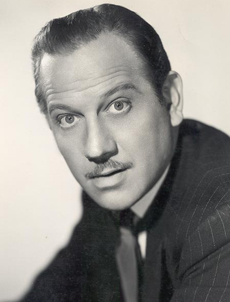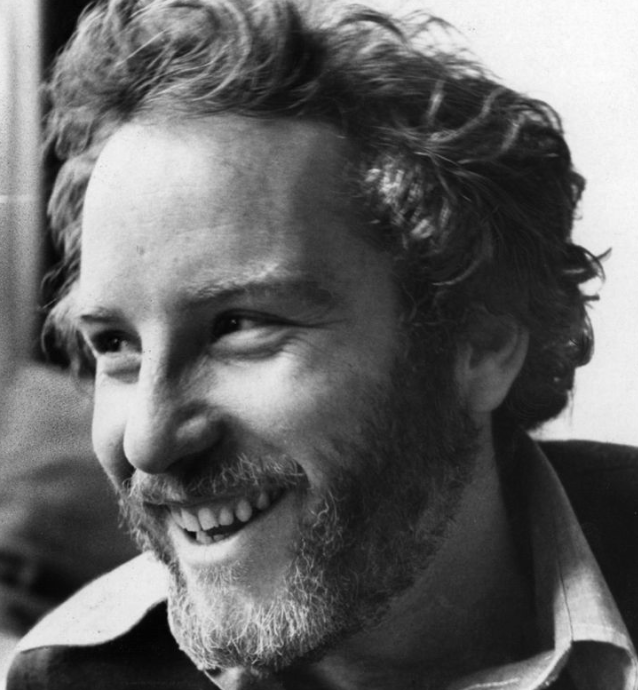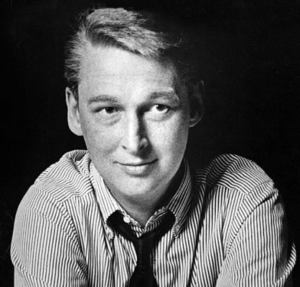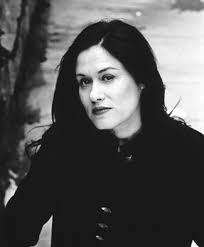 Illeana Douglas may be best known for her work in such edgy fare as “The Larry Sanders Show” and Allison Anders’s “Grace of My Heart” but she also is a true scion of Old Hollywood. Her grandfather was the multiple Oscar-winning actor Melvyn Douglas and she has counted among her friends such film luminaries as Marlon Brando and Martin Scorsese, with whom she had a relationship for ten years. Now she’s penned a memoir, I Blame Dennis Hopper: And Other Stories From a Life Lived In and Out of the Movies, that doubles as a series of profiles of some key Tinseltown figures.
Illeana Douglas may be best known for her work in such edgy fare as “The Larry Sanders Show” and Allison Anders’s “Grace of My Heart” but she also is a true scion of Old Hollywood. Her grandfather was the multiple Oscar-winning actor Melvyn Douglas and she has counted among her friends such film luminaries as Marlon Brando and Martin Scorsese, with whom she had a relationship for ten years. Now she’s penned a memoir, I Blame Dennis Hopper: And Other Stories From a Life Lived In and Out of the Movies, that doubles as a series of profiles of some key Tinseltown figures.
LISA ROSMAN: Tell us about the title. “I Blame Dennis Hopper.” It’s so promising!
ILLEANA DOUGLAS: Well, it’s the running gag in my life. My parents saw “Easy Rider” and were so affected that they started a commune and began living off the land. As I grew up, I realized that not only did that movie directly change my life but it changed so many lives across America. Not just young people’s. Middle class, middle-aged people’s, too. To me, that’s the power of film. Later on, I got to meet Dennis Hopper and I said, “Thanks for ruining my life. You ruined a lot of people’s lives.” He was like, “Sorry.” It’s very sad he passed away because this was something I really wanted to explore in a documentary. He was talking about freedom, man, and a lot of people resonated with that.
 LR: I noticed you turned fifty this year. Was this milestone connected to why you wrote this book now?
LR: I noticed you turned fifty this year. Was this milestone connected to why you wrote this book now?
ID:I’m actually turning age fourteen. (laughs) Well, we’re all at this period where movies are so accessible and we can watch them online but we’re getting away from the experience of watching them together. I wanted to do something about film connecting us. I had no interest in writing about myself because I feel like a career in show business is very fluid and mine will continue to change. My grandpa won his first Oscar later in his life, you know. What I wanted to celebrate were the emotional buttons that movies push for us all. I wanted to be a living historian of cinema. Sometimes I’m concerned: Will anyone really care about someone like Roddy McDowall down the road?
LR: As you pointed out in your book’s introduction, some people really do!
ID: Certain movies and actors just strike a chord in us. It’s about the kinds of movies our moms took us to, the kinds of movies our dads took us to. My parents would take me to foreign films and I’d be like, “I don’t know what this is about.” But we’d discuss them afterward and this is how I learned about the world. And I was inspired, of course, by actors like Richard Dreyfuss.
LR: I never saw the connection between your work and his until you discussed it in your memoir, but you really do share this matter-of-fact indignation.
 ID: That’s why he was the perfect person to steal from. No one was ever going to draw the connection. In acting school I was like, “I’m just going to be Richard Dreyfuss. I’m going to do his walk and talk fast and imitate his cadences.” It went over really well.
ID: That’s why he was the perfect person to steal from. No one was ever going to draw the connection. In acting school I was like, “I’m just going to be Richard Dreyfuss. I’m going to do his walk and talk fast and imitate his cadences.” It went over really well.
LR: You mention in your foreword that director Mike Nichols recommended a number of books, including Nabokov’s Speak, Memory and Augusten Burroughs’s Running With Scissors, that greatly influenced you. What are some other books that you hold dear?
ID: Everything by Robert Graves. He’s heady but very funny. I love I, Claudius. I love Gene Fowler. He wrote about John Barrymore and W. C. Fields. I’m an avid reader of books that may seem obscure, I guess. I also love The Men Who Made the Movies by Richard Schickel and Bring on the Empty Horses by David Niven. I love William Goldman’s books. Believe it or not, Charlton Heston’s memoir is very good. And Peter Bogdanovich’s books are really, really good. The best one may be this biography of Marlene Dietrich written by her daughter Maria Riva. Oh, and right before I wrote my book, I read Roger Ebert’s Life Itself and was very moved by it. I like Marlon Brando’s too, but it’s very fragmented.
LR: The structure of your book is unusual for a star memoir. It almost reads as a series of essays instead.
When I read interviews or stories with movie people, they’re usually fragmented, and I didn’t want that. My grandfather and the Italians in my family were all great storytellers, and they taught me that great stories need to have a real beginning, middle, and an end. I always loved short stories – especially J. D. Salinger’s – so I decided I wanted the book to be like a collection of short stories. I wanted you to be able to pick up any chapter and read it on its own. So each one is an interesting story about a different person.  ID: To me, what’s interesting about my story is that I’ve worked with people like Robert Mitchum, great actors who aren’t here anymore. I feel like my duty is to record these instances, even if I only worked with these people one time. I wanted to tell what about them was different than other people. I felt I had to record all of these ties to the Old Hollywood system.
ID: To me, what’s interesting about my story is that I’ve worked with people like Robert Mitchum, great actors who aren’t here anymore. I feel like my duty is to record these instances, even if I only worked with these people one time. I wanted to tell what about them was different than other people. I felt I had to record all of these ties to the Old Hollywood system.
LR: You’re like a detective. It seems to stem from that quality you say that Mike Nichols spotted in you – being inside and outside the movie at the same time.
ID: I included the Mike Nichols story in my book not to impress you about me but to impress you about him. He could see things about people so powerfully and quickly. But it’s also true. I don’t just want to be in the movies; I want to support the art form on both sides of the lens and with this book, too. It’s a challenge to tell these stories but important if you’ve experienced these legends. You need to preserve the record while you can. We need correct versions! When I worked with [actor/writer] Buck Henry, he told me, “Illeana, you can’t ask me any more questions.” But I had so many for him. The guy is amazing!
LR: You’ve said that you are often asked about the influences of Scorsese on your work but that no one asks him about the influences of Illeana Douglas on his work.
ID: It’s an unfortunate burden that women carry. Men don’t really credit people in their lives. Nobody ever interviewed Alfred Hitchcock or George Lucas or Bogdanovich about how the powerful women they were in relationships with influenced their work. What’s unfortunate is that women are put in a position where they look like they are trolling for attention. Michelangelo Antonioni’s wife actually directed some of his films when he was ill but we’re only going to remember him. It’s very difficult to bring up sexism because there’s a lot of backlash. But we’re in a moment that women are being more vocal about this.
LR: I was super grateful to you for hosting the TCM Trailblazing Women series, which highlighted female directors.
ID: It was great to work on that, and to bring on female directors I’ve worked with like Allison Anders and Nancy Savoca. You know, there’s a lot of media hype about where women are in film, how many women directors there are that don’t get recognition, and I’m glad we’re talking about it. But the real challenge is to see if we’re still talking about this in a year. How much change is there ever going to be? It all feels like a dust cloud. I’m working with Criterion to bring out a top-ten list of films by women directors – “Portrait of Jason,” “The Heartbreak Kid,” “Wanda.” And I’m trying to get at least one woman-directed film on the AFI’s Top 100 list. Will this ever happen? We shall see. If it doesn’t then it means we’re saying publicly that women don’t make movies that are as good as men.
LR: It’s so great you’re putting all this out there.
ID: It’d be great if more people said all this. You go to Sweden and they don’t have this issue. It’s a fifty-fifty ratio of men and women working on film projects. Over there, they’re like, “What do you mean they’re no female directors?” The concept doesn’t exist to them.
LR: What would be the female-directed film you’d most like to get on that AFI list?
ID: I would have to go with “Harlan County, USA” because it’s a documentary that changed the whole form, and Barbara Kopple is one of the great filmmakers of her generation.
LR: Okay, we have time for one more question. As a film historian, what do you think is your grandfather’s best film?
ID: “Ninotchka.”
This was originally published in Word and Film.
